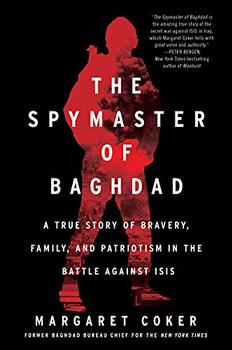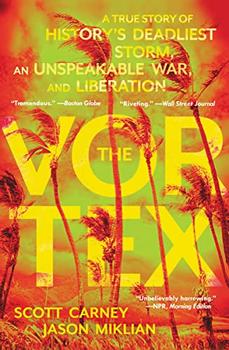Summary | Excerpt | Reading Guide | Reviews | Beyond the book | Read-Alikes | Genres & Themes | Author Bio

A True Story of Bravery, Family, and Patriotism in the Battle against ISIS
by Margaret CokerFor the last 17 years, the country of Iraq has known almost constant violence and political upheaval — the only change being the shifting face of the enemy, blowing in violently like the whipped-up sands of its trackless deserts. Its most recent wars against Al-Qaeda and the Islamic State of Iraq and Syria (ISIS) involve a daily struggle to stay one step ahead of the machinations of radicalized terrorists seeking to maim and kill Iraqi citizens and those designated to protect them. In an increasingly technologically advanced age, meeting the enemy on the battlefield is an anachronism; today, victory requires one of the oldest and most effective tools of warfare — espionage.
In The Spymaster of Baghdad: A True Story of Bravery, Family, and Patriotism in the Battle Against ISIS, Margaret Coker reveals a little-known unit of Iraqi counterintelligence operatives who volunteered to defend their country from those seeking to unleash terror and destruction on their villages, homes and families. Coker, an award-winning investigative journalist and former New York Times bureau chief in Baghdad, brings the reader an authoritative exploration of the homegrown counterterrorism group known as al-Suquor, or "the Falcons." Under the dogged and intrepid leadership of its "spymaster," Abu Ali al-Basri, this unit of well-trained and brave young men inserted themselves into countless potentially deadly situations in pursuit of critical intelligence with the potential to prevent terrorist attacks.
Before getting to the creation of the Falcons, Coker first introduces us to the personal histories of al-Basri and the three young people whose futures will ultimately bend and converge to a collision point. The heart and soul of the book lives and breathes with two brothers from a poor Shiite district: Harith and Munaf al-Sudani. The al-Sudani brothers are born in the slum of Saddam City, into a large family doing their best to avoid Saddam Hussein's Sunni officials while keeping bread on the table. Harith, the eldest son, takes the place of honor in the family, often earning the resentment of his younger brother, Munaf. As Coker lyrically explains, Harith's intellectual talents promise to bring great honor to the family — he earns the best grades in Saddam City in his final exams, ensuring his college acceptance — but his restless spirit results in low marks in his first year of college, disappointing his father. Harith then falls in love, but when his father disapproves of the match, he is forced to end the relationship, initiating a period of restlessness in which the young man searches for his life's purpose. (The brothers' early life experiences are recounted movingly in the excerpt provided by the publisher.)
While Harith's star drops within the family, the often-overlooked Munaf sees his own rise dramatically. Harboring dreams of becoming a police officer from a young age, Munaf sees his chance after the fall of Saddam Hussein. With Shiites no longer suppressed by a Sunni government, Munaf enrolls in the new Iraqi police academy, well on his way to becoming one of the first cadets of Iraq's young democracy. As the al-Sudani family's lives begin to improve, the country takes another nosedive with the violent depredations of Islamic terrorists under the leadership of Al-Qaeda and its most extreme offshoot, ISIS. Coker deftly weaves in the Iraqi political and military reactions to these external and internal threats in a way that intertwines the al-Sudani brothers' fortunes with those of Abu Ali al-Basri and the Falcons.
Perhaps the most jarring of Coker's subjects, Abrar al-Kubaisi, or "the Daughter of Iraq," is juxtaposed with the patriotic Iraqi brothers. Serving as a class counterpoint to the impoverished Shiite brothers, Abrar grows up a privileged Sunni daughter in an academic family living in a beautiful west Baghdad neighborhood. Her elevated level of education — she pursues a PhD in chemistry at Baghdad University — does not help her cope with the sectarian violence following Hussein's fall from power. Indeed, as Coker hauntingly illustrates through alternating chapters, al-Kubaisi's journey from an intelligent academic with a bright future to an embittered young woman radicalized after a family tragedy, is a chilling one. Her late-night internet chat sessions with other radicalized Iraqis using the avatar Bint-al-Iraq (the Daughter of Iraq) foreshadow her bigger ambitions: to join the Islamic State and use her chemistry degree to deadly effect. Coker describes Abrar's travels among some of the world's most dangerous men with page-turning urgency. With a haunting sense of dread, the reader knows this will not end well.
The book hits its stride as the real work of the Falcons begins. After hearing of Munaf's promising reports at the police academy, al-Basri, now the Iraqi prime minister's head of security, recruits him, and eventually his brother Harith as well. With open admiration, Coker describes a renewed and refocused Harith, fervent to serve and defend his fellow Iraqis. After a terrorist bombing comes close to harming his son, he volunteers for the most dangerous Falcon mission of all: infiltrating ISIS. Here the book soars as the reader learns of the heart-stopping subterfuge Harith undertakes from inside the belly of the beast. His courage and skill as an operative over the 16 months of his ISIS infiltration ultimately lead to the prevention of 48 terrorist attacks, 17 of which, according to Coker, might have had the destructive capacity of the 1995 Oklahoma City bombing.
Patriotism in its most insipid form of rowdy flag-waving is not the same as the patriotism that requires the ultimate sacrifice. In The Spymaster of Baghdad, Coker takes us behind Middle East headlines to get a glimpse of a story most often hidden or obscured in journalistic reporting: the service and sacrifice of hundreds of patriotic Iraqis seeking to defend their country. Through the moving accounts of Munaf, Harith and Abrar, Coker poignantly shows how those notions of patriotism took different forms with divergent ends in a country continually fighting for its existence.
![]() This review was originally published in The BookBrowse Review in March 2021, and has been updated for the
February 2022 edition.
Click here to go to this issue.
This review was originally published in The BookBrowse Review in March 2021, and has been updated for the
February 2022 edition.
Click here to go to this issue.

If you liked The Spymaster of Baghdad, try these:

by Scott Carney , Jason Miklian
Published 2023
The deadliest storm in modern history ripped Pakistan in two and led the world to the brink of nuclear war when American and Soviet forces converged in the Bay of Bengal.

by Ava Homa
Published 2021
The unforgettable, haunting story of a young woman's perilous fight for freedom and justice for her brother, the first novel published in English by a female Kurdish writer.
I find that a great part of the information I have was acquired by looking something up and finding something else ...
Click Here to find out who said this, as well as discovering other famous literary quotes!
Your guide toexceptional books
BookBrowse seeks out and recommends the best in contemporary fiction and nonfiction—books that not only engage and entertain but also deepen our understanding of ourselves and the world around us.